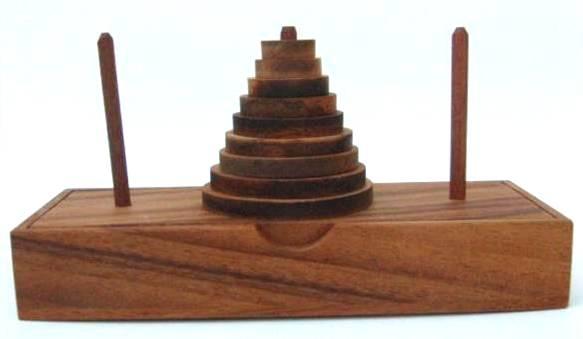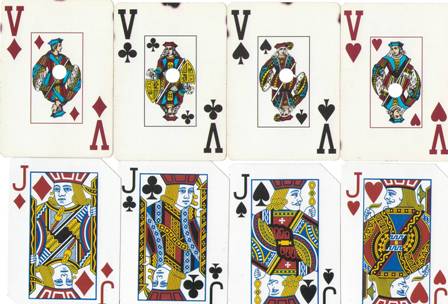Ask The Wizard #276
What are the most common sets of numbers players pick for lottery tickets?
The following table shows the three most frequent set of numbers chosen according to the Quebec Lottery. The number of tickets is out of a total of 366,518 sold for the Jan. 30, 2010 lottery. For those who don't recognize the pattern of the third set, those were the "Lost" numbers, which played a significant role on that show.
Quebec Lottery Most Frequent Picks
| Numbers | Number of Sales in Quebec | Frequency |
|---|---|---|
| 7-14-21-28-35-42 | 824 | 1 in 444.8 |
| 1-2-3-4-5-6 | 424 | 1 in 864.4 |
| 4-8-15-16-23-43 | 377 | 1 in 972.2 |
By extrapolating, if the numbers 7-14-21-28-35-42 were drawn by the Lotto 6/49 game then the jackpot would be split among thousands of players, each receiving only 0.03% of the jackpot.
My advice, if you must play the lottery, is to go with a Quick Pick.
I have noticed the same puzzle recently in both Rise of the Planet of the Apes and the Reward Challenge on the first episode of the latest Survivor season. What is this game called and what is the strategy?

Image courtesy of Brilliant Puzzles.
Yes, I saw that episode of Survivor as well, where the player was struggling with the puzzle. I was screaming at the television that I could have solved it in 30 seconds and then bored them back at camp for three hours about the mathematics of it.
The puzzle is called the Tower of Hanoi. For the benefit of other readers, the puzzle consists of three pegs and any number of pieces, each the same shape but a different size. The starting state should have all the pieces on one peg, in order, with the largest one at the bottom. The object is to move the entire stack to another peg. However, you may not move any piece on top of a smaller piece. Here is an online version of the game.
The strategy is a simple recursive one. In computer programming logic, here is the function how to do it. For example, to move 10 pieces from peg 1 to peg 2 you would call TowerOfHanoi(10, 1, 2, 3).
void TowerOfHanoi(int NumberPieces, int origin, int destination, int storage)
{
if (NumberPieces == 1)
{
cout << "Piece 1 to peg " << destination << "\n";
}
else
{
TowerOfHanoi(NumberPieces-1, origin, storage, destination);
cout << "Piece " << NumberPieces << " to peg " << destination << "\n";
TowerOfHanoi(NumberPieces-1,storage,destination,origin);
}
}
Here is the output for a five-piece game:
Piece 1 to peg 2
Piece 2 to peg 3
Piece 1 to peg 3
Piece 3 to peg 2
Piece 1 to peg 1
Piece 2 to peg 2
Piece 1 to peg 2
Piece 4 to peg 3
Piece 1 to peg 3
Piece 2 to peg 1
Piece 1 to peg 1
Piece 3 to peg 3
Piece 1 to peg 2
Piece 2 to peg 3
Piece 1 to peg 3
Piece 5 to peg 2
Piece 1 to peg 1
Piece 2 to peg 2
Piece 1 to peg 2
Piece 3 to peg 1
Piece 1 to peg 3
Piece 2 to peg 1
Piece 1 to peg 1
Piece 4 to peg 2
Piece 1 to peg 2
Piece 2 to peg 3
Piece 1 to peg 3
Piece 3 to peg 2
Piece 1 to peg 1
Piece 2 to peg 2
Piece 1 to peg 2
In English this code means that to move any piece you follow these three steps:
- Move all the pieces above it, if any, to the storage peg.
- Move the desired piece to the destination peg.
- Move all the pieces that were moved from step 1 to the destination peg.
Where I say to "move all the pieces," just follow the same instructions above but for the substack you want to move. Eventually you will get down to moving just a single peg.
If you follow these instructions, you will move the stack in the minimum number of moves, which is 2NumberPieces-1.
There are other ways to express a solution in English. Here is a clever one where the initial stack is on peg A. The destination stack will be B for an odd number of pieces, and C for an even number. Keep repeating these steps until finished:
- Make legal move between A and B.
- Make legal move between A and C.
- Make legal move between B and C.
Finally, here is an outside link to a binary number solution.
I follow Macau casino stocks and they often quote the casino's theoretical win percentage at VIP Baccarat to be 2.85% of dollars wagered. This number is used by pretty much everyone to forecast earnings for the companies. I was wondering how they calculate this number, and whether this is accurate in your opinion.
That is likely a weighted average of all four types of bets on the table. Most of the money is bet on the Player and Banker, with a house edge of 1.24% and 1.06% respectively. However, the Tie and Pair bets carry much higher house edges of 14.36% and 10.36% respectively. Players apparently are betting a little on this to increase the overall win percentage to 2.85%.
The table below shows a hypothetical mix of bets that arrive at the overall Macau Win Percentage, ignoring the issue of Dead Chips.
Macau Baccarat — Weighted House Edge
| Bet | House Edge | Ratio of Bets | Expected House Edge |
|---|---|---|---|
| Player | 0.012351 | 43.25% | 0.005342 |
| Banker | 0.010579 | 43.25% | 0.004575 |
| Tie | 0.143596 | 11.50% | 0.016514 |
| Pairs | 0.103614 | 2.00% | 0.002072 |
| Total | 100.00% | 0.028503 |
Hi, I live in Iran. I read your site and enjoyed your comments about blackjack, in which i have a great interest. I like to play and use your chart in the game, but it's difficult for me to visit Las Vegas, where great casinos exist with very little house edge. Since I live in Asia, I would like to know where I can find fair casinos to play blackjack with a fair house edge, besides Macau.
It isn't every day I get a gambling question from Iran. I could be wrong, but based on a look at the World Casino Directory, the closest casino I can find that has confirmed blackjack is the Zodiac Casino in Amaty, Kazakhstan. Their web site indicates that they have roulette, blackjack, and 6 Card Poker (whatever that is). Unfortunately, I can't vouch that they are fair or have competitive rules.
Simple question. What is a Jack anyway, as in the playing card?
To be honest, I'm not entirely sure. They used to be known as Knaves, but at some point they became known as Jacks. Perhaps about the time they started to put numbers and letters on cards (they didn't used to) and it would have been confusing because both King and Knave start with a K. So that brings up the question of what is a Knave? dictionary.com gives us these definitions, aside from the playing card usage:
- an unprincipled, untrustworthy, or dishonest person.
- male servant (archaic).
- man of humble position (archaic).
Given the company the Knave keeps with kings and queens, you would think the Knave is a male servant. Playing cards were certainly around during "archaic" times. However, the fact that the Knave turned into a Jack argues for a "man of humble position." dictionary.com says one of the various meanings of the word jack:
- fellow; buddy; man (usually used in addressing a stranger): Hey, Jack, which way to Jersey?
The expressions "Jack of all trades" and "That's the fact, Jack" also spring to my mind. Wikipedia mentions that the Knave was called a Jack in the game All-Fours before cards were printed with a J, but the term may have been slow to catch on because it was considered "vulgar." I don't always trust Wikipedia, so take that with a grain of salt, as with everything in this answer.
To help us further, let's look at a deck of French cards I happen to have from the Casino De Montreal. In that deck they use an R for Roi (king), D for Dame (lady), and V for Valet. It should be noted that the French word for queen is reine, so I suspect they went with a lady instead, to avoid two ranks that begin with an R. So, what is a Valet? www.french-linguistics.co.uk gives this definition:
- manservant; je ne suis pas ton ~ I'm not your slave
That would seem to go along with the English "male servant." Still, I'm not entirely comfortable with that, because if that is the meaning, how did they go from Knave to Jack? I suggest that the better translation, to avoid words that start with K and Q, would have been to follow the French and go with Valet, which has a similar meaning in English. Here are the dictionary.com usages for Valet:
- a male servant who attends to the personal needs of his employer, as by taking care of clothing or the like; manservant.
- a man who is employed for cleaning and pressing, laundering, and similar services for patrons of a hotel, passengers on a ship, etc.
- an attendant who parks cars for patrons at a hotel, restaurant, etc.
In closing, let me be the first to suggest that we replace the J on English playing cards with a V, and call them valets.
This question was raised and discussed in the forum of my companion site Wizard of Vegas.



